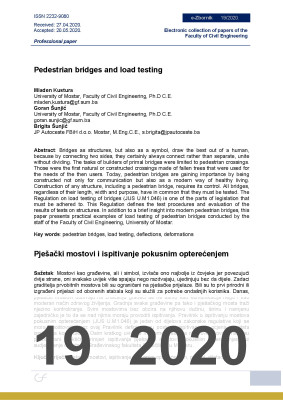ISSN 2232-9080
PEDESTRIAN BRIDGES AND LOAD TESTING
- e-ZBORNIK: No. 19, June 2020, Vol. 10
- Autor(i): Mladen Kustura, Goran Šunjić, Brigita Šunjić
- Tip rada: Professional paper
- DOI: https://doi.org/10.47960/2232-9080.2020.19.10.88
Abstract: Bridges as structures, but also as a symbol, draw the best out of a human, because by connecting two sides, they certainly always connect rather than separate, unite without dividing. The tasks of builders of primal bridges were limited to pedestrian crossings. Those were the first natural or constructed crossings made of fallen trees that were used for the needs of the then users. Today, pedestrian bridges are gaining importance by being constructed not only for communication but also as a modern way of healthy living. Construction of any structure, including a pedestrian bridge, requires its control. All bridges, regardless of their length, width and purpose, have in common that they must be tested. The Regulation on load testing of bridges (JUS U.M1.046) is one of the parts of legislation that must be adhered to. This Regulation defines the test procedures and evaluation of the results of tests on structures. In addition to a brief insight into modern pedestrian bridges, this paper presents practical examples of load testing of pedestrian bridges conducted by the staff of the Faculty of Civil Engineering, University of Mostar.
Keywords: pedestrian bridges, load testing, deflections, deformations







